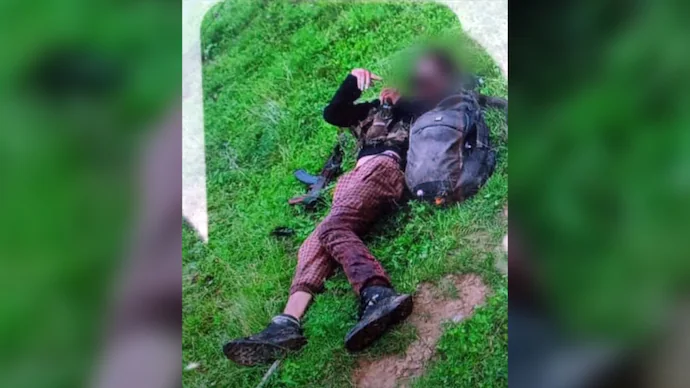Operation Akhal: Gunfight Erupts in Kulgam as Forces Intensify Hunt for Pahalgam Attackers
- MGMMTeam

- Aug 2, 2025
- 3 min read
On the evening of August 1, 2025, an intense gunfight broke out in the Akhal forest area of Devsar, located in South Kashmir’s Kulgam district, marking the third major anti-terror operation in just one week. This latest engagement, codenamed Operation Akhal, is part of an escalating counterterror campaign by Indian forces in Jammu and Kashmir following the horrific Pahalgam attack in April, which claimed 26 lives.
Security forces, including personnel from the Indian Army, Jammu and Kashmir Police, Central Reserve Police Force (CRPF), and Special Operations Group (SOG), launched a coordinated cordon-and-search operation after receiving intelligence inputs about the presence of heavily armed terrorists believed to be linked to the Pakistan-backed terror outfit, Lashkar-e-Taiba (LeT), operating under its proxy name The Resistance Front (TRF).

The Encounter: A Fierce Forest Gunbattle
The operation began late Thursday evening when the joint forces surrounded the suspected area in the dense Akhal forests. As the troops advanced, they came under heavy fire, triggering a prolonged exchange that continued into the night. By the early hours of August 2, two terrorists were confirmed dead, while at least one more was believed to be hiding in the region. Authorities stated that the operation would continue until the area is completely sanitized.
The encounter site was sealed off, and reinforcements were deployed to prevent any escape attempt by the trapped terrorists. Residents in nearby villages were advised to remain indoors as a precaution. The situation remained tense, with intermittent bursts of gunfire echoing through the surrounding woods.
Link to the Pahalgam Massacre
Initial reports suggest that the terrorists targeted in Operation Akhal had direct involvement in or links to the April 22 Pahalgam attack, where militants opened fire on a group of tourists, deliberately segregating victims based on their religion. The attack led to the deaths of 26 people, mostly Hindus, along with one Christian and a local Muslim who tried to protect the victims. The perpetrators were later identified as Pakistani nationals belonging to the TRF, which is widely acknowledged as a front for Lashkar-e-Taiba.
In response to the Pahalgam tragedy, security forces had launched Operation Mahadev on July 28, which resulted in the elimination of three high-value terrorists, including the mastermind of the attack, Suleiman Shah alias Hashim Musa. His associates, Jibran and Hamza Afghani, were also killed in that encounter.
The Broader Counterterror Push: A String of Operations
Operation Akhal is the third significant anti-terror mission in a span of just one week. Prior to it, Operation Shivshakti had been carried out on July 30 in the Poonch sector, resulting in the killing of two more militants who attempted infiltration from across the Line of Control. These swift and targeted operations underscore the heightened preparedness and strategic coordination among Indian security forces.
According to Home Ministry sources, these operations are part of a broader strategy to dismantle cross-border terror infrastructure, eliminate sleeper cells, and send a strong message to terrorist handlers operating from Pakistan. The Special Operations Group (SOG), known for its expertise in jungle warfare and covert field tactics, has been instrumental in conducting these high-risk missions.
Voices of Grief and Resolve
Families of the Pahalgam victims have expressed relief over the neutralization of some of the key perpetrators but continue to seek justice and permanent peace. “This is only the beginning. We want not just revenge but an end to terror,” said a grieving relative of one of the slain tourists. The attacks have left deep scars across communities and raised serious questions about continued cross-border support for terrorism.
Union Home Minister Amit Shah, in a recent statement, praised the armed forces for their “swift and surgical” actions and reaffirmed the government’s commitment to completely eradicating terrorism from Jammu and Kashmir. He also detailed how the militants were tracked using a combination of technical surveillance and human intelligence gathered over several weeks.
Conclusion: The Fight for Peace Continues
The ongoing encounter in Kulgam underlines the volatile security situation in Kashmir and the resilience of India’s counterterror framework. While the success of Operations Mahadev, Shivshakti, and now Akhal highlights the effectiveness of recent counterterror initiatives, the fight is far from over. The presence of well-trained foreign terrorists, their access to advanced weaponry, and continued support from across the border demand constant vigilance and robust response strategies.
As the nation prepares to observe Independence Day later this month, security forces remain on high alert to ensure peace in the Valley and to prevent any attempts to disrupt harmony. For now, Kulgam remains a focal point in a larger story of sacrifice, resistance, and the unwavering pursuit of justice.
(Sources: India Today, NDTV, Hindustan Times)




Comments